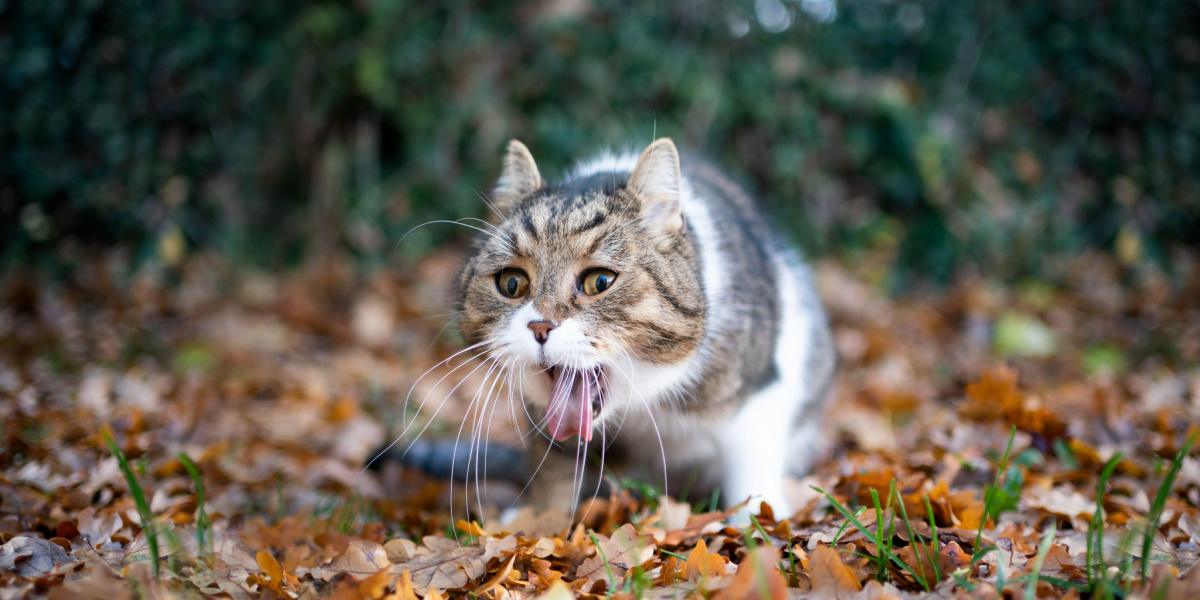
Talking about cat vomit never makes for pleasant conversation. But, when it comes to cat care, vomiting is quite an important topic. It becomes urgent when there’s blood involved. A cat vomiting blood, called hematemesis, is a serious medical issue that requires veterinary attention and care.
Quick Overview: Cat Vomiting Blood
 Urgency: High
Urgency: High
 Requires Vet Visit: Yes
Requires Vet Visit: Yes
 Seen in Cats: Sometimes
Seen in Cats: Sometimes
 May be Linked to: Stomach ulcers, inflammatory bowel disease (IBD), foreign material, gingivitis or other severe inflammation in the mouth causing bleeding, ingestion of some rat poisons, intestinal parasites, clotting disorders, certain medications, cancer.
May be Linked to: Stomach ulcers, inflammatory bowel disease (IBD), foreign material, gingivitis or other severe inflammation in the mouth causing bleeding, ingestion of some rat poisons, intestinal parasites, clotting disorders, certain medications, cancer.
 Treatment Options: Anti-nausea/vomiting medication, subcutaneous or intravenous fluids, medications to protect the stomach and GI tract, dewormers for parasites, specific treatments for rat poison ingestion, inflammatory bowel disease, and clotting disorders. Treatment for cancers depends on the type.
Treatment Options: Anti-nausea/vomiting medication, subcutaneous or intravenous fluids, medications to protect the stomach and GI tract, dewormers for parasites, specific treatments for rat poison ingestion, inflammatory bowel disease, and clotting disorders. Treatment for cancers depends on the type.
Are you sufficiently convinced that cat vomit is an issue worth talking about? We sure hope so.
Keep reading to learn more about blood in a cat’s vomit and what you can do if your cat is vomiting blood.
What Does Bloody Vomit Look Like?
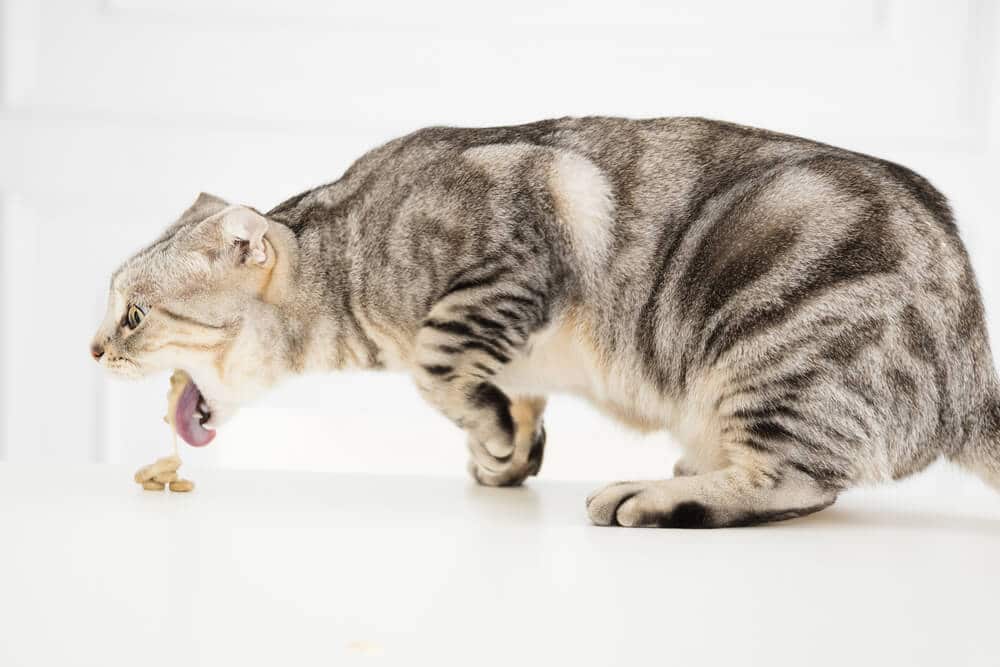
You can identify whether your cat is vomiting or regurgitating by observing him in the act. Regurgitating is quick and looks almost effortless.
Of course, blood in the vomit will be red. But there’s more to it than that. The blood’s color and consistency give clues as to why there’s blood in the vomit in the first place.
Bright, red flakes of blood in the vomit indicate a problem in the upper gastrointestinal (GI) tract, which includes the esophagus, stomach, and upper small intestine.
If the blood looks like coffee grounds, that signals a problem lower down in the GI tract, such as the lower small intestine and large intestine. The blood looks like coffee grounds because it has been partially digested.
No matter what the blood looks like, it’s never normal for cats to vomit blood.
Why Is My Cat Vomiting Blood?
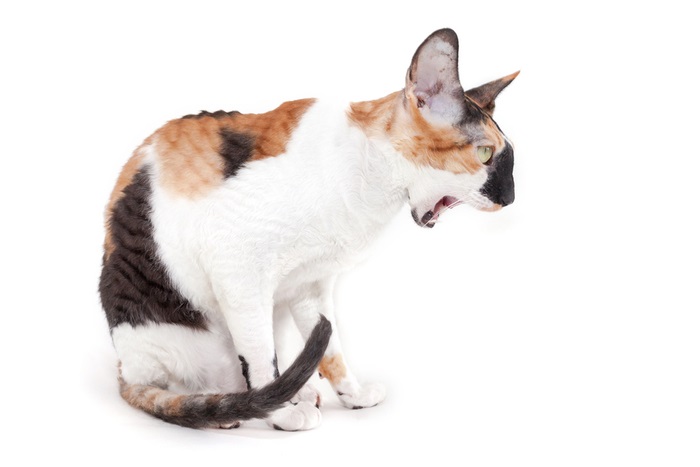
A cat throwing up blood may point to a variety of issues. All of them are serious.
Cats vomit blood for many reasons, none of which are good. We’ll go through these reasons below.
- GI tract ulcers- GI tract ulcers can occur when the protective soft tissue lining of the tract is damaged by infection. When that lining is damaged, it starts to bleed. In cats, bacterial infections are a common cause of GI tract ulcer. Cats with GI tract ulcers have other symptoms, such as loss of appetite, weight loss, and possibly bloody diarrhea.
- Foreign body ingestion- Cats are notorious for munching on string, which wreaks havoc when swallowed. The string gets caught and tangled in the intestines, causing inflammation of the GI tract lining that can eventually lead to blood in the vomit. Also, sharp foreign objects can cause physical tears to the lining, causing bleeding.
- Gingivitis- Gingivitis is inflammation of the gums. Inflamed gums, if not promptly treated, can start to bleed. A cat with bleeding gums will swallow this blood, feel ill, and vomit that blood right back up. Cats with gingivitis may have trouble eating and have excessive drooling.
- Inflammatory Bowel Disease (IBD)- The word ‘inflammatory’ says it all. Chronic inflammation in the intestines damages the lining. In addition to vomiting blood, cats with IBD often have diarrhea, weight loss, depression, and tiredness.
- Rat poison ingestion- Rat poison is effective at killing rats but is highly toxic for cats. A cat that ingests rat poison directly, or eats a rat that ingested the poison, will become very ill because of the poison’s toxic ingredients. These harmful ingredients cause clotting disorders that can ultimately lead to bloody vomit. Cats that ingest rat poison also have difficulty breathing, eat less, and have excessive thirst.
- Parasites- Internal parasites such as hookworms and heartworms can cause cats to vomit blood. Hookworms have tiny hooks that they use to latch on to the GI tract lining, causing the lining to bleed.
- Cancer- Mast cell tumors commonly cause bloody vomit in cats. Mast cells are immune cells that help to regulate how the body responds to allergies. When these cells go awry and form a tumor in the intestines, cats can vomit blood and exhibit other symptoms, such as diarrhea and discolored stool (tar or bright red).
- Clotting disorders- Cats with clotting disorders have a hard time forming blood clots, leading to excessive bleeding. One of these clotting disorders, called hemophilia, can cause cats to vomit blood. Fortunately, hemophilia in cats is rare.
- Medications- Non-steroidal anti-inflammatory medications are known to damage the GI tract lining, causing bleeding. This bleeding can lead to a cat vomiting blood.
What Should You Do?
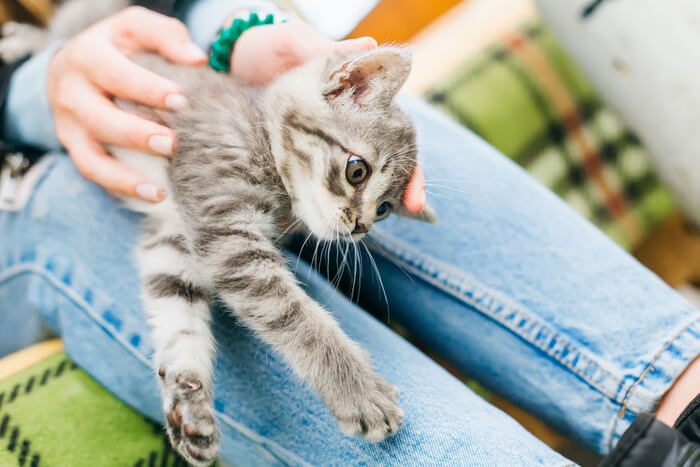
If your cat is vomiting blood, take action immediately. Contact your veterinarian as soon as you can and schedule an appointment.
Blood in cat vomit is not necessarily a life-threatening issue, but it does need to be taken seriously. If your cat is vomiting blood, contact your veterinarian promptly to schedule an appointment.
Your veterinarian will perform a thorough physical exam, ask you questions about the vomit, and perform diagnostic tests to determine why your cat is vomiting blood.
As concerned as you may be that your cat is vomiting blood, be prepared to provide as much detail as you can about the vomiting:
- When the vomiting started and how long it’s been going on
- Appearance of the blood in the vomit
- Other symptoms your cat is experiencing
- Ingestion of rat poison or a foreign body
In some instances, such as rat poison ingestion, it can help to bring a sample of the vomit with you for testing. However, check with your veterinarian first before collecting the sample.
After the initial history and physical exam, your veterinarian will perform whichever diagnostic tests will be most helpful in identifying the cause of the bloody vomit. Testing options include routine bloodwork, blood clotting tests, a fecal exam, and x-rays.
Treating a Cat That Is Vomiting Blood
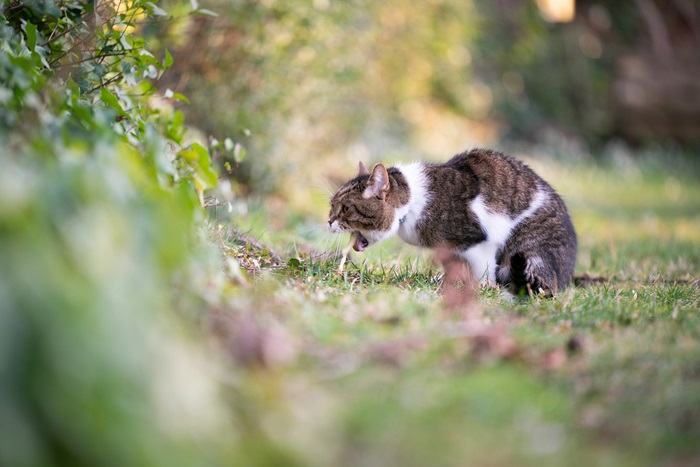
Treatment for a cat vomiting blood depends on the underlying condition and severity of the vomiting itself.
If your cat is vomiting blood, your veterinarian will determine the best course of treatment according to what’s causing the bloody vomit and how quickly your cat is losing blood.
Treatment options are listed below:
- Intravenous fluids to rehydrate your cat
- Anti-vomiting medications
- Medications to protect the GI tract lining
- Antibiotics to treat bacterial infections
- Dewormers to kill intestinal parasites
If your cat is critically ill, they will need to be hospitalized until they are stable and strong enough to return home.
Treating Your Cat at Home
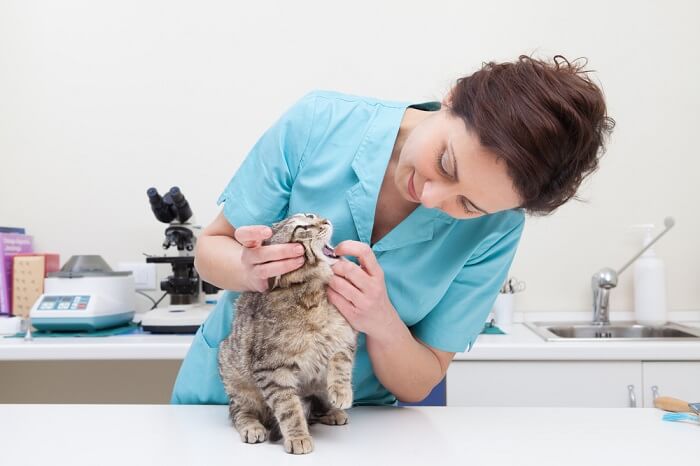
Follow all of your veterinarian’s treatment recommendations for your cat. In addition to medications that your cat may need, it is a good idea to feed your cat an easily digestible diet that is low in fat and fiber. This diet will provide your cat with nutrients but not make the GI tract work so hard when it needs to heal from the vomiting.
Bringing It Together

Cat vomit is never pleasant, especially when there’s blood involved. Blood in cat vomit signals an underlying health problem, so take your cat to your veterinarian if you notice blood in their vomit.
Follow your veterinarian’s treatment plan to get your cat back to good health.
Frequently Asked Questions
Why would a cat puke up blood?
Cats vomit blood for many reasons, such as gastrointestinal tract ulcers, intestinal parasites, and rat poison ingestion. Also, swallowing foreign bodies, such as string or sharp objects can damage the GI tract lining enough to cause bleeding. Other causes are cancer and clotting disorders.
When should I be concerned about my cat vomiting?
It is normal for cats to vomit occasionally. You should be concerned if your cat is vomiting every week and this vomiting has been going on for at least several weeks. Blood in the vomit is always a cause for concern.
Can eating grass cause a cat to vomit blood?
Eating grass can stimulate a cat to vomit. However, eating grass has not been shown to be a cause of cats vomiting blood.




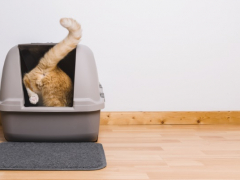



My cat threw up blood with a watery consistency n had a little foam it was a bright red n has loss of appetite n is lethargic… I have no money n no way of paying for a vet bill what can I do where can I turn to for help n what is causing him to throw up blood n is there any over the counter meds that I can give my cat…. I know animals can take some human medications n what r they n how much do I give my cat
Thank you Lori
Hi Lori, I’m so sorry you’re both going through this. Unfortunately, I can’t advise any treatment until we know what’s going on with your cat. You may be able to get advice from a vet over the phone, and you can also explore some lower-cost options, including the ones listed in this article.
I called my vet this morning. I got an appointment Monday at 2:30 unless they get a cancelation. Thank you for your reply.
Wishing you and your cat all the best. – Mallory
My cat vomited bright red blood once this morning. She is eating normal and I grow oat grass for them to eat. Should I be concerned?
Hi Tammy,
Vomiting blood is not normal for cats, so seeing blood in your cat’s vomit is a cause for concern. Contact your veterinarian; they may want you to bring your cat in for further examination.
One of my cats vomited blood during the night. there were 3 little puddles of dried blood, quite dark in color with a texture like sand. Problem is, i have two cats, and i don’t know which one did the vomiting. is there a way to tell which cat did it? What should I do?
Hi Elizabeth,
I’m sorry to hear that one of your cats vomited blood. If one of your cats has been experiencing other symptoms of illness (e.g., reduced appetite, lethargy), it is probably that cat that vomited blood. Blood in the vomit is often a sign of another GI issue that needs veterinary care. Contact your veterinarian as soon as you can and provide details about the vomit (appearance, frequency of vomiting) and schedule an appointment. Continue to monitor your cats, especially if you are not yet able to determine which cat vomited.
Hello, my cat vomited once grass with bile and then she vomited little bit of saliva with a bit of blood, this accompanied previous days of noises in the intestines and one day of stinky gases, otherwise she is completely normal, the veterinarian told me to give her a chicken and rice diet but they don’t eat chicken or rice, I had to give her cat food again and today she started with gas again but nothing more. What should I do?
Hello Maira, thanks for the comment. I wonder if a dietary change would help. You can try something that is still conventional cat food but a bit more digestible, like the foods on this list . That could help to alleviate some of that gassiness and help your cat feel better. A probiotic supplement may also help.
my cat ingested some glittery metal strings and is vomiting bright red blood. Will that resolve itself on his own? what can the vet do in this case?
The vet may be able to extract the strings, perhaps with surgery. I’m sorry about the late reply and hope you were able to resolve this with the help of a vet!
Hi My Chloe has been to the vet She has a UTI. they put her on a stronger then the one they injected Verflox is what I am giving her know @ 1.5. She threw up a puddle of bright red blood…I am waiting to hear back from the doctor in the mean time I am going a teaspoon of puree organic pumpkin…is this ok
Hi Jennifer, I know this was about a week ago, but I wouldn’t recommend giving a cat anything to eat in this situation. Wait for advice from your veterinarian. Hope everything turned out okay for you and Chloe.
my friends cat has vomited 4 puddles of pur dark blood. no mucus in it. what could it be?
Hi Karen, I would recommend that your friend brings their cat to the veterinarian. It’s impossible to identify the cause of this situation by simply reading this comment, but this is a serious issue that demands veterinary examination and care.
Cat has vomited watery blood, about 4 times has not eaten and very lethargic.
Hi Patrice, I would strongly recommend taking your cat in to see the veterinarian. Hope everything turns out well.
Hi Patrice,
I am wondering what was happening with your cat? My cat is also vomiting water with light red color, I am assuming it’s blood, after eating grass. And was lethargic for a day, would you mind sharing what was happening with your cat? It might help me! Thank you!